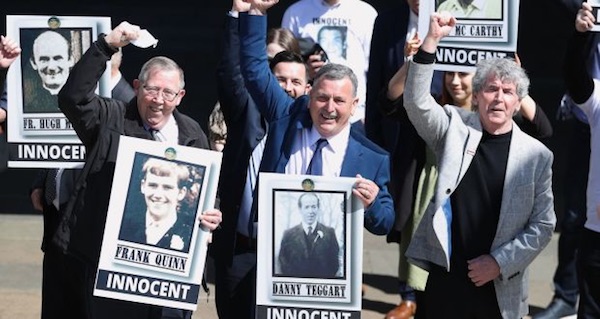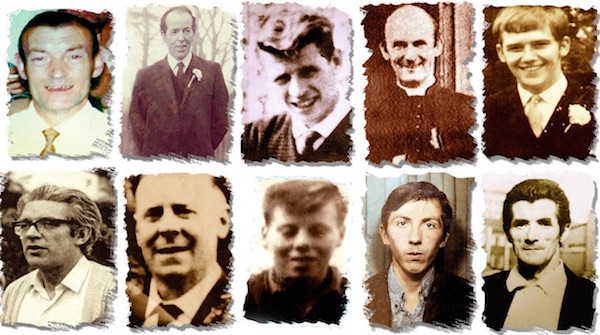
After fifty years of British state lies and cover-ups, a coroner has finally ruled today that those killed in the Ballymurphy massacre were entirely innocent.
A day of huge emotion was marked by tears and cheering as the victims were found to be “entirely innocent of any wrongdoing”, “posed no threat” and “unconnected to paramilitaries”.
The inquest looked at ten killings in the Ballymurphy area of west Belfast over a 36-hour period in August 1971.
After decades of pain and frustration, Coroner Keegan attributed nine of the ten killings directly to the British Army and said the murders were a violation of Article 2 of the European Convention on Human Rights, the right to life.
The victims included the parish priest, Fr Hugh Mullan, who was waving a white object as he went to help a wounded man, and mother-of-eight Joan Connolly, who was only 44 years old when she was shot through her eye as she went to aid a victim. She was shot again repeatedly and the British Army left her to bleed to death for the next six hours”.
An eleventh victim, not covered by the inquest, Paddy McCarthy, died of a heart attack after an encounter with a number of British soldiers.
The inquest was held up for decades by the delaying tactics and dissembling of the British military. The families of the victims even had to fight for recognition that their loved ones were the victims of a single massacre, which took place five months before Derry’s Bloody Sunday and which also involved the same British Army Parachute Regiment.
Today was a day of immense comfort for all the families.
Patrick Doherty, whose father Eddie was killed, said he wished his mother had lived long enough to hear the coroner’s finding that Eddie was “shot in the back”.
“It is a weight off my shoulders, it’s been 50 years of serious hard grief and pain, I just feel serious relief,” he said.
“I wish my mother could have been here to see it. My mother died six years after my father and it is just relief. We have always known he was an innocent man, we have always known everyone was innocent and it took 50 years. There is a sense of happiness that we have finally cleared our loved ones’ names. It has been a long fight.”
Eileen McKeown, the daughter of Joseph Corr, said the 50-year battle for justice had taken an enormous toll on her family.
“We have fought long and hard for this, for 50 years, to declare my daddy an innocent man. My mummy died knowing he was innocent but not getting any justice. I have lost four brothers to this, through the stress and the trauma that they had to live through.
“My brother Joe was with my daddy when he was shot. He lived with survivor’s guilt for years because of the fact that he left his daddy.”
But she described the inquest verdict as “brilliant”.
“I was expecting them just to say they were innocent. But when she turned around and said that my daddy and John Laverty weren’t gunmen, and never should have been branded gunmen, that was really brilliant to hear that.”
Ms McKeown said she had felt unable to speak about her father before because of the lies told about the Ballymurphy victims.
She said: “It’s been a nightmare. No matter where you went, people would be asking you what happened to your daddy.
“You were afraid to say what happened to your daddy because he was shot, and because of what was written in the history books: that IRA gunmen were shot in Ballymurphy in 1971.
“People just presumed that they were guilty because of what was put out in the media and what the Army said.”
Geraldine Douglas, another daughter of Joseph Corr, said the verdict means that the grandchildren and great-grandchildren “don’t have to keep fighting the way Eileen has fought for our family for all these years. The fight is won, big time.”
False claims of UVF paramilitary involvement in the shootings were rejected, and Justice Keegan concluded the victims were shot by the British Army without justification.
In regard to the killings of Francis Quinn and Fr Hugh Mullan, the coroner found that both were “innocent men, not armed or acting in any untoward manner” and who had instead gone to help a wounded man. She said that the use of force was “clearly disproportionate”.
Of Fr Mullan, Justice Keegan said she was “quite convinced he was a peacemaker” who was waving a white object when he was shot in the back.
The coroner said there was no evidence linking four people killed in the area of a British Army barracks to the IRA, and found that the killings of Noel Philips, Joseph Murphy, Joan Connolly and Daniel Teggart were not justified.
“These were innocent people, this was a tragedy for all of the families who’ve had to live with the memories of events,” she said.
In regard to Mr Teggart, she rejected the false claim of one British military witness that ammunition had been found in his pockets. She said there was no doubt they were shot from the area of the British base by the paratroopers, were posing no threat and that no arms were found “anywhere on or near” those killed.
She also said there had been a “basic inhumanity” in how long Mrs Connolly had been left to lie injured on the ground. However, she said she could not determine whether the delay in treatment had contributed to her death.
Another man, Eddie Doherty, died after being shot on the Whiterock Road as he came across a barricade across the road.
The coroner rejected the British military lie that Mr Doherty had thrown a petrol bomb prior to his death. She said he had been an “innocent man, who posed no threat”.
The judge also found that Joseph Corr and John Laverty were shot by the British Army in the back, and that there was no evidence either of the men were “gunmen”.
The coroner said she was unable to determine who exactly killed John McKerr, a maintenance worker and former British soldier, who died of his injuries nine days later, based on the evidence available. However, she noted the authorities had failed to properly investigate his death at the time.
“I have no hesitation in saying Mr McKerr was an entirely innocent man going to and from work when he was indiscriminately shot on the street,” she said.
The coroner was strongly critical of the British military evidence provided to the inquest, and contrasted the general statements provided by the British army with the specific picture painted by local eyewitnesses.
She was also critical of the limited investigations carried out at the time. In one case no evidence statements were collected, and she said the “failure to investigate at the time made my task extremely difficult”.
“After more than 100 witnesses, and more than 100 days of evidence, today’s findings serve to shed further light on the brutalisation of innocent people by forces of the British State in the North," said Aontú’s Peadar Tóibín.“The findings of the inquest today are very welcome for the families of the victims, with who we share our solidarity, thoughts and prayers.”
Sinn Féin’s North Belfast MP John Finucane responded to the verdict in a tweet: “Innocent! For 50 years they never gave up. Today the Ballymurphy families heard what they always knew - Their loved ones, murdered by the British state, were entirely innocent. Today the truth won.”
Sinn Féin’s deputy leader Michelle O’Neill described what happened in Ballymurphy 50 years ago was “state murder and for decades the British government have covered it up. Now the truth has been laid bare for all to see”.
However, justice for the families seems as distant as ever following an announcement today of apparent plans by the British government to legislate for an amnesty for British state crimes during the conflict.
The plan was referred to today by the English queen in the official programme for government announcement known as ‘the Queen’s Speech’, and was widely criticised.
Ms O’Neill said the proposals would “slam the door to justice closed in the face of these families and others killed by the state or as a result of collusion.
“As the findings from the inquest were being read, the British government was announcing its plans to legislate to cover up its role in the conflict and to put current and former British soldiers beyond justice and the law.
“British state forces cannot be above the law.”

![[Irish Republican News]](https://republican-news.org/graphics/title_gifs/rn.gif)
![[Irish Republican News]](https://republican-news.org/graphics/title_gifs/harp.gif)

